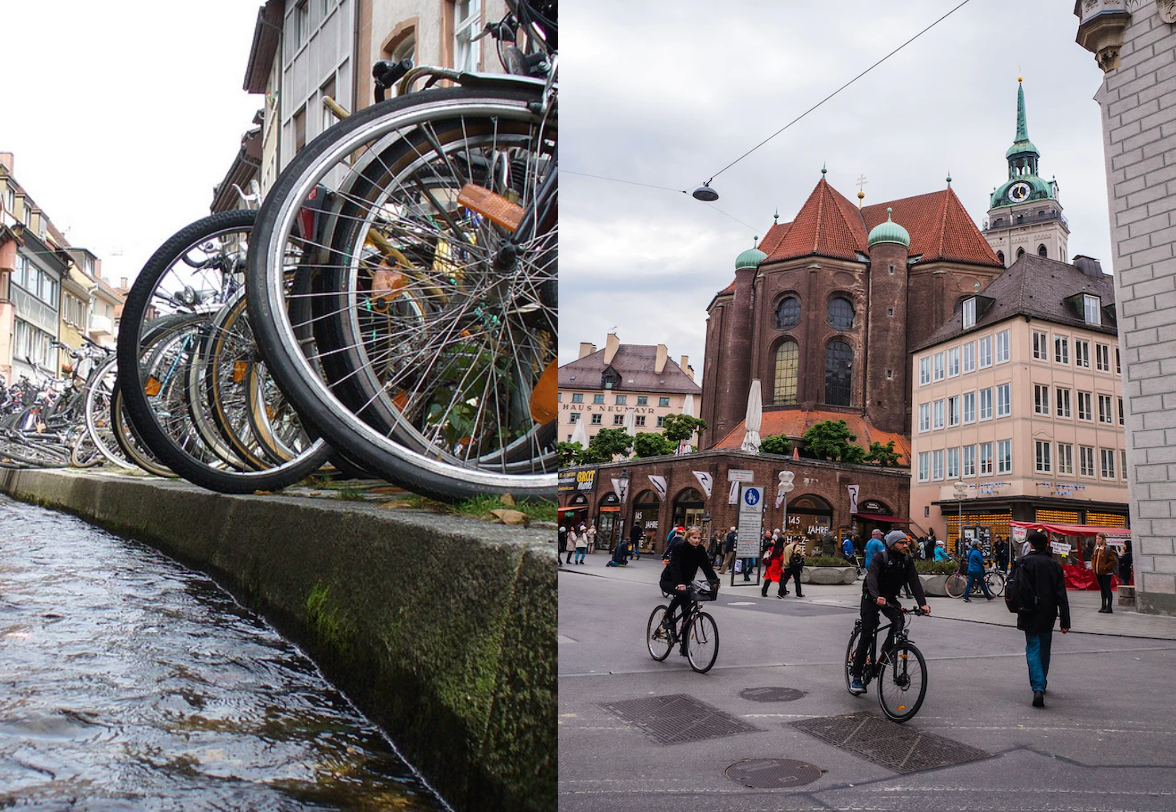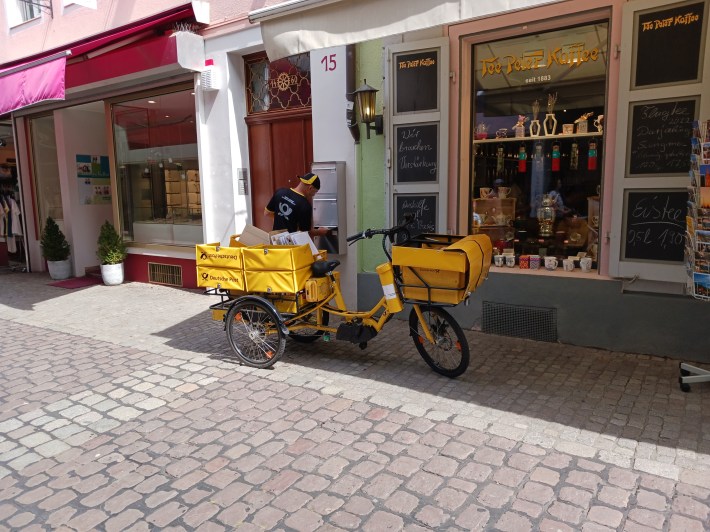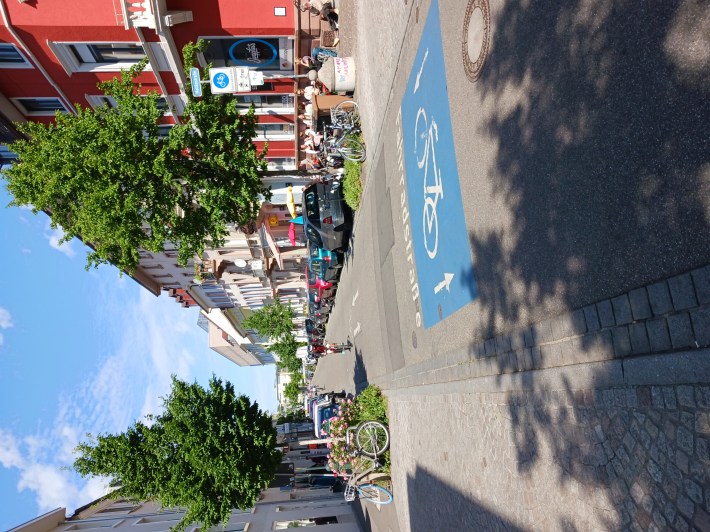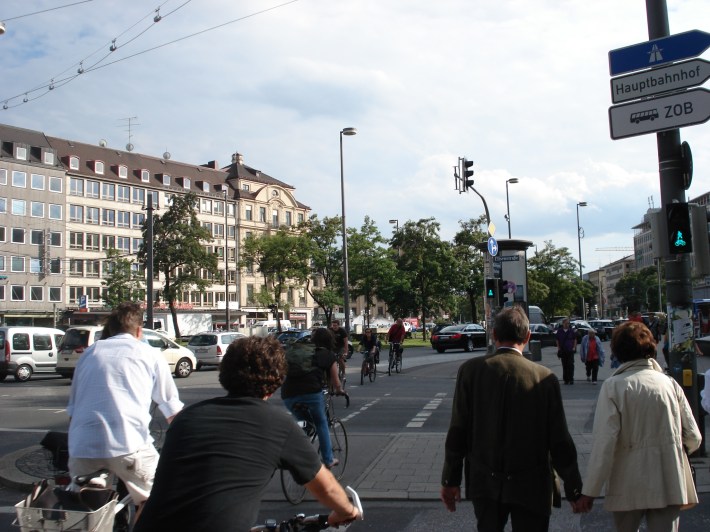Editor's note: This article is part of the “Cycling Through COVID-19” series from world-renowned cycling researchers Ralph Buehler and John Pucher and is published with permission from the authors. In this series, we’ll explore how 14 large cities around the world adjusted their cycling policies during the first years of the COVID-19 pandemic, as well as how those policies contrasted with their approach in the decades prior. In each, Buehler and Pucher also explore how each city’s plans for future investment in cycling inLeffrastructure and programs have been impacted by the pandemic.
Read the rest of the articles in this series as they’re published here, or check out the full paper in Sustainability.
Freiburg, Germany
With its 230,000 inhabitants, Freiburg is the gateway to Germany’s Black Forest area and one of Germany’s most bicycle-friendly cities.
The share of trips made by bicycle in Freiburg increased from 15 percent in 1982 to 34 percent of trips in 2016. Freiburg’s oldest permanent bicycle counter, installed in 2013 close to the city’s main train station, detected a 44 percent increase in the number of cyclists between 2013 and 2019. Cycling in Freiburg is safe and convenient. All areas of Freiburg are accessible by bicycle, thanks to a network of over 450 kilometers of bikeways along all major roadways as well as traffic calming of over 75 percent of the city’s streets, with speed limits reduced to 30 km/h or lower.
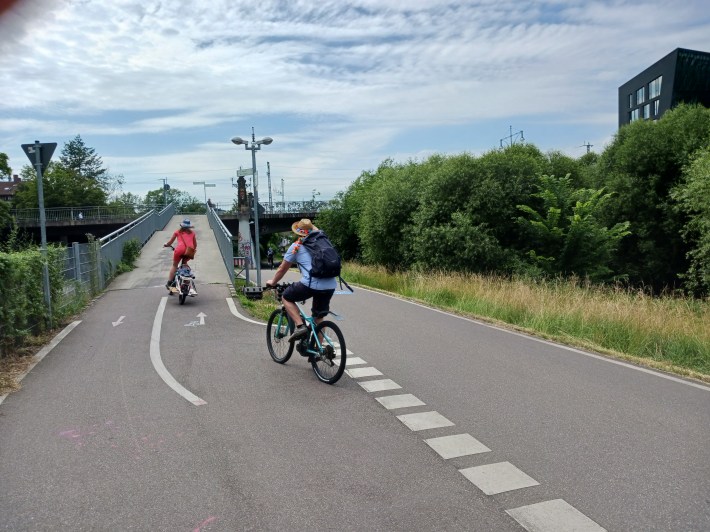
Freiburg continued to implement bicycle-friendly policies during the COVID-19 pandemic but not specifically in response to COVID-19. The main reason was that Freiburg was already so bicycle-friendly prior to the COVID-19 pandemic. On a few roadways that had more than one car travel lane per direction and no bicycle lanes, Freiburg installed permanent rather than pop-up bicycle lanes (e.g., Schlossbergring).
Freiburg’s three permanent bicycle counters, including the oldest counter at the main train station, showed a decline of 11 percent of bicycles in 2020 compared to 2019. The bicycle counters are located along commuting routes. The main reason for the decline in bicycle trips was remote working and learning from home, especially during periods of lockdowns, where offices, businesses, stores, universities, and schools were closed.
In 2021, cyclist levels were higher than in 2020, but still 8.5 percent lower than in 2019, prior to the COVID-19 pandemic. Although not a response to COVID-19, Freiburg’s bikesharing system Frelo completed its first full year of operation in 2020. It served 330,000 trips that first year and 375,000 in 2021, with the increase partly due to an expansion from 74 to 85 docking stations and 530 to 615 bicycles.
As part of its long-term improvement in cycling conditions, Freiburg implemented bicycle-friendly policies during COVID-19. For example, the city installed 700 new bicycle parking spots in the city center in 2020 and 2021. In late 2020, Freiburg also increased its budget for cycling measures to eight million euros per year in 2021 (from roughly 1.2 million euros per year 2015 through 2020) as part of the city’s ambitious policy aimed at improving active travel. The policy was a response to a grassroots citizen petition that collected 40,000 signatures in three months in fall 2020, demanding more bicycle-friendly city policies. The new policy calls for wider and protected bicycle lanes and paths, better connectivity of the bikeway network, safer intersections, and a stronger commitment to reduce car travel.
In addition, Freiburg will work more closely with neighboring jurisdictions to improve bikeway connections between the city and its surrounding region. Key to that effort will be a new network of 90 kilometers of bicycle expressways. In cooperation with the German federal government, Freiburg is studying the effects of the city’s new extra-wide bicycle lanes implemented along major roadways by significantly narrowing car travel lanes to make space for wider bicycle lanes.
In 2019, Freiburg passed a new climate mobility plan to reduce CO2 emissions, as part of the city’s role as a pilot community in the state of Baden Wuerttemberg. The plan calls for a 40 percent reduction in CO2 emissions from 2010 by 2030. The plan explicitly includes bicycle promotion. It also focuses on a reduction in driving. As a first step, the city has increased the cost of residential parking permits from 30 Euros per year to 240–480 euros, with higher prices for larger vehicles.
In short, Freiburg was one of Germany’s top cycling cities long before COVID-19, built on its pro-cycling policies during COVID-19, and has plans to vigorously promote cycling and discourage driving in the coming years.
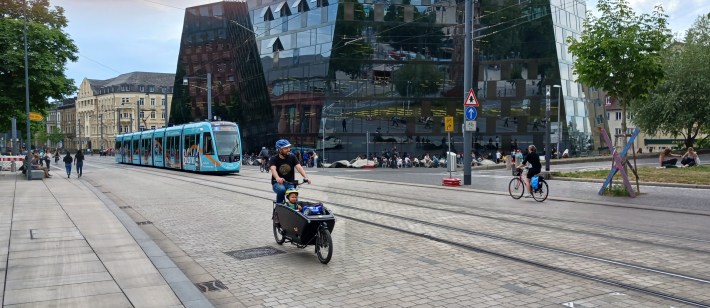
Munich
With 1.5 million inhabitants (metro 2.6 million), Munich is Germany’s third largest city. The share of daily trips by bicycle in Munich increased from 10 percent in 2002 to 18 percent in 2017 — the year of Munich’s most recent travel survey.
In 2019, the City of Munich had 500 kilometers of bicycle lanes, 450 kilometers of traffic-calmed streets (with a speed limit of 30 km/h or less), and 260 kilometers of off-road bicycle paths or shared-use trails in parks. The same year, grassroots cycling-advocacy groups collected 160,000 signatures on petitions (Radentscheid and Altstadt Radlring) to the city council to make Munich more bicycle friendly. That convinced the Munich City Council to formally adopt a new Bicycle Plan to accelerate its efforts to promote cycling. The specific goals of the new policy are to create a new city-wide bicycle-priority network, to improve cyclist safety at intersections, to provide more bicycle parking, and to improve the safety and comfort of existing and new bicycle infrastructure along main streets. The 2019 plan will be financed by 25 million euros in additional funding for walking and cycling per year.
Permanently installed bicycle counters measured a 19 percent increase in bicycle trips in Munich between 2019 and 2020. That increase was sustained in the 2021, as counters measured roughly the same number of cyclists as in 2020. In response to the COVID-19 pandemic, the city installed 4.6 kilometers of pop-up bicycle lanes in 2020 along critical corridors without existing bikeway infrastructure. The pop-up bicycle lanes were implemented as a pilot project with the goal to improve cyclist safety. In winter 2020 and 2021, the lanes were discontinued while data were analyzed. After demonstrating positive safety outcomes, the lanes were re-installed in 2021 and will now be made permanent.
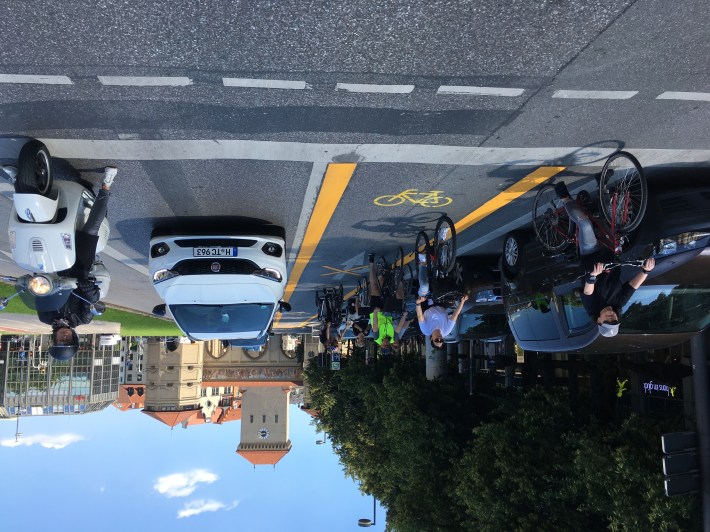
While pop-up bicycle lanes received a lot of media attention, the real focus during 2020 and 2021 was on laying the groundwork for implementing the city’s 2019 Bicycle Plan. Most of the projects included in that plan will be built in the coming years, as the typical duration of a bikeway infrastructure project in Munich is roughly three years from initial planning to completion.
These projects include widening protected bicycle lanes to 2.30 meters. That will provide more space for cyclists to pass each other and for the fast-growing number of electric cargo bicycles, which are wider than normal bicycles. Munich’s older bicycle lanes, which were only 1.30 m wide, will also be upgraded and widened. The city will gain this additional roadway space for cycling by removing some car travel lanes and on-street car parking spaces.
Munich also greatly expanded the number of bicycle parking spaces in the city, building 3600 bicycle parking spaces in 2020 alone. Planning for new cycleways has been greatly enhanced by the creation of a new Mobility Department in the city administration that hired 30 additional city staff to work on cycling issues (up from a total of 15 employees in 2019, reaching 45 in 2021).
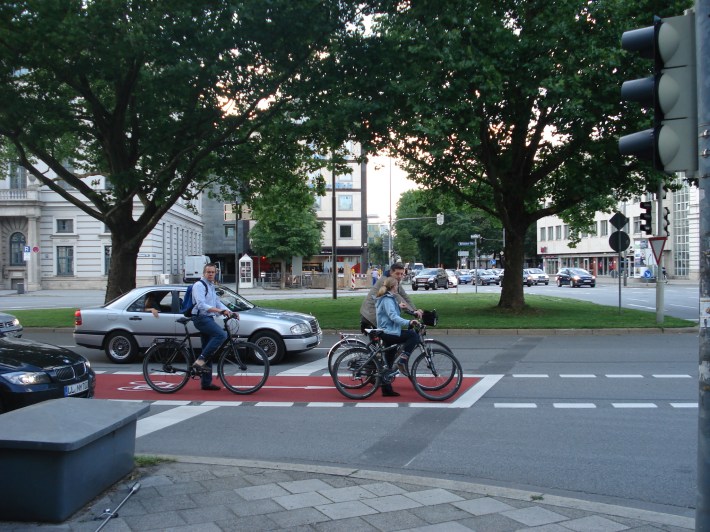
Continuing a program that started in 2017, the city subsidized the purchase of e-bikes and e-cargo bikes in 2020 and 2021 by paying for 25 percent of the cost of an electric bicycle, up to 1000 euros. The program saw an increase in demand in 2020 and 2021, with over 3300 electric bicycle purchases subsidized. In 2020, the city opened a new 240 meters long pedestrian and cyclist bridge across 37 rail tracks approaching Munich central station to provide a crucial new connection for cyclists.
In the coming years, Munich will continue to implement the projects in its 2019 Bicycle Plan. The ultimate goal is to raise the city’s bicycle mode share of trips from 18 percent to 25 percent by 2025 — and to reduce the share of trips by car from 35 percent to 20 percent. Other goals include a car-free historic town center and a circumferential ring bikeway of 2.3 to 2.8 meter-wide protected bicycle lanes around the historic center. The city also intends to build radial cycling expressways connecting the city center to outer areas of the city and its surrounding region. In a 2021 survey, 19 percent of Munich residents say that they want to ride bicycles more often after the pandemic is over, suggesting strong growth in future years.
